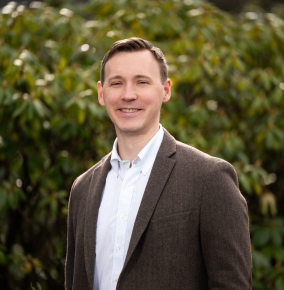Nicholas Hardy

What does your research focus on?
Our group primarily focuses on free-space laser communication (lasercom), but the majority of my projects have involved underwater communication and quantum optical communication. While my work mostly spans the theory and systems side (math, computer simulation, and system design), I spent much of 2022 and 2023 in the lab and at field sites to demonstrate lasercom between a helicopter and an underwater buoy. The experience was challenging, with my responsibilities spanning optical design and testing, system control software implementation, hardware and system integration, and even securing the O-ring seals on the underwater payload. It was a significant departure from analyzing quantum entanglement distribution networks, which was a focus in preceding years. The diversity of work experiences has been engaging and helped me grow as an engineer.
What is the most challenging part of your work?
Building complex systems requires an understanding of both high-level mission requirements and constraints, and the capabilities of individual components. I enjoy finding the path between the two to design a successful system. For example, our recent helicopter-to-undersea lasercom demonstration required integrating the control system with the helicopter navigator for accurate pointing, and modifying the optical design so the terminal could have variable focus without shaking out of alignment. I also had to design a system that could be fully remoted from the helicopter to the boat via a limited radio link.
How has your career at the Laboratory evolved?
When I first started at the Laboratory in 2014, I was generally working with a more experienced colleague who could check my work. As I gained experience, that safety net went away. I became the one responsible for study results and moved into systems engineer roles with greater responsibility. My group office has been supportive and provided a number of different opportunities, from quick-turn studies on interesting topics to system builds and field demonstrations. I’ve come to appreciate the responsibility we have at the Laboratory to provide analysis, guidance, and technology for national defense, and the role that I can play in supporting that mission.
Where are you from?
I grew up in Peoria, Illinois — a medium-sized city in the middle of the state that is primarily known for the presence of Caterpillar (the earthmoving-machines company) and area hospitals. I enjoyed growing up in the Midwest and go back home when I can. That said, I have very much enjoyed living in the Greater Boston area since moving here for graduate school, and I can’t imagine moving back.